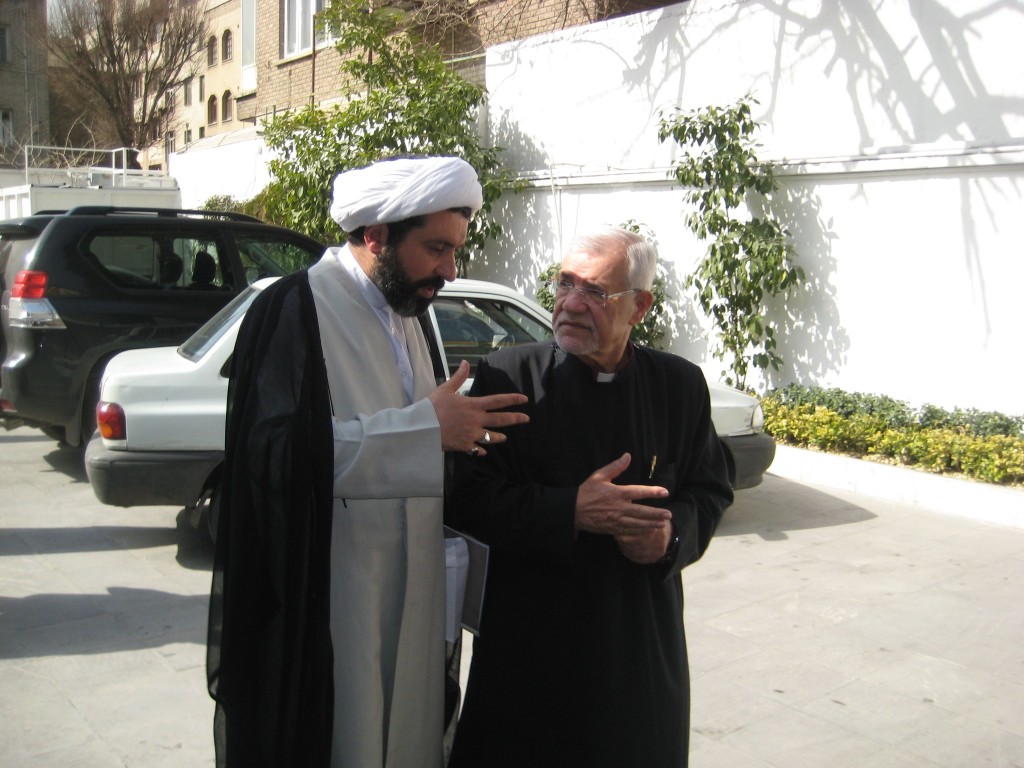“When you can joyfully sit and eat together,meaningfully pray together, and feel at home and close to God in one another’s holy sites, then surely you have really become intimate friends.” —Dr. Mohammad Shomali, Afterword, 5th Catholic Shi’a Dialogue
As the first session of Eastern Mennonite University’s Summer Peacebuilding Institute (SPI) comes to a close this week, guest lecturer Dr. Mohammad Shomali reflected warmly on the past 10 days among fellow international peacebuilders.
In more than 20 years of participating in interfaith dialogue, Shomali has travelled widely. He is the director of international affairs at the world’s largest Shi’a Islam seminary for women, Jami’at al-Zahra, as well as director of the International Institute for Islamic Studies (IIIS). He resides in Qom, Iran.
“I feel at home in many places in the world,” Shomali said, “but Eastern Mennonite University is one of those places where I really feel at home.”
Shomali has met Mennonites in a variety of contexts in both North America and around the world, and has developed friendships with many of them. “The Mennonites are people who are loyal to their faith, and they want to live the gospel, but not in a rigid way,” he said. “They don’t just want to live this on Sunday, but throughout the week, they want to be like Jesus. I respect this. I love this. They are interested in being forces of good in the world, whether it is in helping people with development or peacebuilding or relief.”
Peace and peacebuilding, along with interfaith dialogue, is one of the core Quranic principles, Shomali says. This was one reason why nine female students, staff, and graduates from Jami’at al-Zahra are studying at SPI this summer, escorted by Shomali and his wife, Mahnaz Heidarpour, who also teaches at the seminary. In prior years, SPI has hosted a total of 10 students from Iran, but never a group of this size all at once.
The nine women have joined 130 international students until May 24 to learn concepts and practices of peacebuilding, trauma, conflict analysis and resolution, and restorative justice. The students are being co-hosted by EMU’s Center for Justice and Peacebuilding (CJP), as well as its Center for Interfaith Engagement, both based on EMU’s main campus in Harrisonburg, Virginia.
Shomali was a guest lecturer in the Faith-based Peacebuilding course, facilitated by Roy Hange, a Mennonite pastor who has lived in the Middle East. The interfaith course helps participants identify sources of conflict and resources for peacebuilding found in various faith communities and traditions. Five of the Iranian seminarians chose to take this course.
Interactions with SPI students from around the world provide a practical complement to required seminary coursework in comparative peace studies, Shomali said. “Theoretical knowledge can come through books, but when the students eat and talk together and go to churches, this is different. They learn about the way people think, live, behave, and plan. This is very valuable.”
In addition to daily classes, the group made two special trips dedicated to interfaith dialogue. One weekend, they visited the Mennonite Central Committee (MCC) headquarters in Akron, Pennsylvania, met with an Amish bishop, and attended a service and Sunday school class at James Street Mennonite Church in Lancaster, Pennsylvania. A later day trip to Washington D.C. included a meeting with MCC Washington office staff and a visit to the El-Hibri Foundation, which promotes understanding of Islamic values of peace and respect for diversity. At the El-Hibri office, they met with the leaders of Karamah, Muslim Women Lawyers for Human Rights. In the evening, the group had a meeting at Georgetown University, organized by CJP graduate Rasoul Naqavi.
Most of the women in the group had participated in previous trips, led by Shomali in 2011 and 2012, to study Anabaptist and Christian theology at Canadian Mennonite University in Winnipeg, Manitoba.
The exchange continues later this month in Qom with the 6th Mennonite-Shi’a dialogue. A delegation from EMU includes professor Christian Early, Center for Interfaith Engagement director Ed Martin and several students.
Shomali has also cultivated friendships and dialogue with other faith communities, most notably the Catholic Church. He has been a key contributor to five Shi’a-Catholic dialogues, the first taking place in England in 2003 and the most recent in Qom in 2012.
His interest in interfaith dialogue grew from his religious and philosophical studies as a seminary student in Qom. He holds a B.A. and an M.A. in western philosophy from the University of Tehran, as well as a doctorate in philosophy from the University of Manchester in the United Kingdom. While in the U.K., Shomali developed an interest in the Focolare Movement, an organization devoted to encouraging unity and brotherhood among the practitioners of Christian religions, among followers of other world religions, and, more broadly, among all of humanity.
The unity of God and of man is also an important Quranic principle, Shomali says. “God has created you from one man and one woman, but made you into different tribes and nations so that you know each other, not that so you fight each other. We should not see these differences as barriers, but extra reasons to know each other.”
Those of the Abrahamic faiths have a “joint responsibility for brotherhood,” he said. “Muslim-Christian dialogue for me is a way to reunite or unite a family which is unfortunately sometimes broken. Sometimes you have cousins that you stop communication with or who you lose touch with. Muslim-Christian dialogue is a reunion of the family of Abraham and the children of God.”
Shomali is also resident Imam and director of the Islamic Centre of England. His books have been published in a number of languages, including Malay, Kiswahili, Spanish and Swedish.
